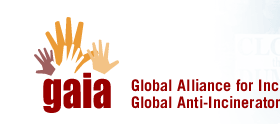The incineration, cement and plastics industries promote so-called “waste-to-energy” incineration as a “clean” and “renewable” alternative to conventional fossil fuels – but nothing could be farther from the truth! Incineration – which is simply the process of burning waste – is even dirtier than burning any other fossil fuel and squanders energy and finite resources.
Burning waste is one of the most carbon-intense sources of energy: it can double the carbon dioxide (CO2) emissions per unit of electricity of coal and oil fired power plans.[1] Moreover, in many countries, incinerators require added auxiliary fossil fuels to manage burning the high proportion of organic waste, which defeats any energy efficiency argument in favor of waste incineration. Ultimately, incinerators produce negligible energy for the enourmous costs involved.
The amount of waste that is burnt represents only the tip of a very big iceberg of waste and despoliation created across the materials economy and lifecycle of products. Burning recyclable or reusable resources drives a climate-changing cycle of new resources pulled out of the earth, processed in factories, shipped around the world, and then wasted in incinerators and landfills. A U.S. EPA analysis found that the provision of food and goods systems contribute to 42% of U.S. greenhouse gas emissions,[2] so resource efficiency and zero waste strategies are to play a key role in the battle against climate change.
In addition to contributing intensively to climate change, even the most technologically advanced incinerators release thousands of pollutants that contaminate our local air, soil and water. Pollutants like dioxin and mercury enter the food supply and concentrate up through the food chain.
Rather than burn their garbage, cities around the world are working toward the achievable, sustainable goal of Zero Waste.[3] Reducing, reusing, recycling and composting create livelihoods, save money, and protect the environment and public health. These efforts go hand-in-hand with clean production, producer responsibility, and waste minimization programs for dangerous and hard-to-recycle materials. Together, these practical, bottom-up strategies also provide some of the best decentralized urban solutions for reducing climate pollution and conserving energy and natural resources.
On this Global Month of Action Against Dirty Energy WE RESOLVE that:
- We will include waste incineration in our education efforts against dirty energy. Burning waste is highly polluting and generates negligible amounts of energy.
- Incineration should be banned from our governments’ renewable energy portfolio and/or subsidy programs. So-called “waste to energy” incineration is dirty energy, NOT renewable energy, as it relies on the continuous production of waste from finite resources.
- Our governments should divest from all types of incinerators, including too-good-to-be-true gasification, pyrolysis, and plasma arc technologies, and instead support zero waste systems. Both incinerators and landfills contribute to climate change and encourage over-consumption, they have no place in a sustainable future.
- Zero Waste communities and resilient local economies are the way of the future. Zero Waste creates jobs, saves money, and is an essential strategy to combat climate change while conserving valuable resources and energy. Zero Waste is already a working solution in dozens of places across the world.
Tweet



[…] GAIA: Sign the Global Resolution against Waste Burning and for Zero Waste […]
Pingback by GAIA: Sign the Global Resolution against Waste Burning and for Zero Waste | vernetblog — December 2, 2013 @ 10:59 am